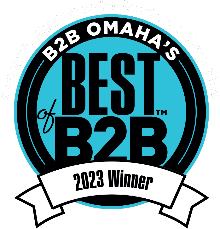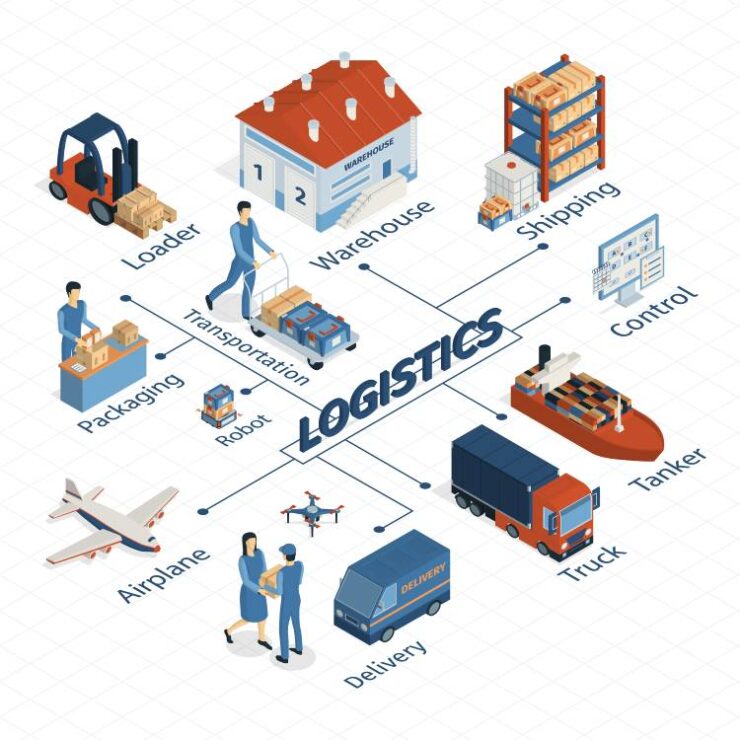One of the most important aspects of any company with a high volume of inventory is logistics. Logistics is the process of overall product management from point of sale to fulfillment. Companies that maintain a large inventory must have logistical solutions for their warehouse storage that work with their overall workflow processes.
Logistics is a critical part of supply chain management and consumer demand. Having an effective logistical warehouse process helps with the following aspects of your business:
- Reduction in errors and product dama
- Loss prevention from stolen or damaged products.
- Increase in labor productivity.
- Customer satisfaction improvement.
- Increase of brand value.
- Improvement of product utility.
- Deliverability.
- Provides safe and secure storage.
- Makes planning and organizing logistics easier
- Reduces the risk of supply chain disruptions and inventory mishaps.
Why Warehouse Logistics is Important
Warehousing allows companies to satisfy the demands of their customers for fast and efficient order fulfillment. In the digital age, the logistics of product management must be the most efficient possible. Allowing logistics to handle your supply chain needs in an efficient way not only helps your company’s overall productivity but also ensures maximum customer satisfaction. And, we all know that customer satisfaction is the most important component of any successful business.
There is certainly a science to logistics but there is also an art to it as well. Creating effective warehouse logistics requires someone who can visualize efficiency. Someone who can see the chain supply from start to finish.
Warehouse logistics also requires the ability to problem solve. A successful logistical strategy must have the ability to foresee problems before they happen. You never want the first time you encounter a problem to be on the front end of customer fulfillment. However, problems do happen. So it must also be a part of the logistical strategy to have a process to deal with these problems efficiently when they arise.
Warehouse and Product Management
Poor inventory management can destroy a company. Telling a customer that the product they thought they were able to receive is now on backorder can destroy even the strongest relationship between a customer and your product.
There used to be a consumer philosophy that argued having a limited stock count can increase sales by increasing consumer demand. This would lead some companies to strategically limit stock of new items. However, not only is this an unproven philosophical perspective but is a risky approach to sales. In fact, just the opposite is true. According to F. Curtis Barry & Company, backorders can reduce sales by at least 10%.
There is also legal ambiguity in this practice. According to the Federal Trade Commission’s: Mail, Internet, or Telephone Order Merchandise Rule states:
“…sellers who solicit buyers to order merchandise through the mail, via the Internet, or by phone to have a reasonable basis to expect that the sellers can ship within the advertised time frame, or, if no time frame is specified, within 30 days.”
Moreover, if the company cannot achieve this requirement, it must:
“…obtain the buyer’s consent to a delay in shipping or refund payment for the unshipped merchandise.”
This can drastically increase the workload in other areas of the company.
Barry’s research also indicates that backorders can cost between $15 – $20 per backorder fulfillment. This is generally because there are additional costs to handle customer service additional shipping and packing costs, etc. This eventually erodes your company’s profit.
10 3PL Best Practices to Consider
It is important in any industry to have best practices as they help establish accountability. When evaluating and selecting a 3PL provider, it is essential to consider several key criteria to ensure a successful partnership. Here are 10 important factors to consider:
Expertise and Industry Knowledge: Evaluate the 3PL provider’s experience and knowledge in your industry. A provider with expertise in your specific sector will better understand your unique needs and challenges, improving the effectiveness of their services.
Capabilities and Services: Assess the range of services offered by the 3PL provider. You should ensure they can meet your current needs and accommodate future growth or changes in your supply chain requirements. Consider services such as transportation management, warehousing, order fulfillment, inventory management, and value-added services.
Technology Systems: Evaluate the technology infrastructure and systems used by the 3PL provider. They should have robust logistics software, warehouse management systems, and transportation management systems to streamline operations, provide real-time visibility, and facilitate efficient communication with your business.
Scalability and Flexibility: Consider whether the 3PL provider can scale their operations to accommodate your growth and seasonal fluctuations in demand. They should be flexible enough to adapt to your changing business requirements without compromising service quality.
Network and Geographic Coverage: Assess the geographical reach of the 3PL provider’s network. Determine if they have strategically located warehouses, distribution centers, and transportation capabilities to support your supply chain efficiently. Consider their ability to handle international logistics if you have global operations.
Performance and Track Record: Review the 3PL provider’s performance metrics and track record. Look for references, customer testimonials, and case studies that demonstrate their ability to deliver consistent, reliable, and high-quality services. Consider their on-time delivery, order accuracy, return management, and customer satisfaction rates.
Pricing Structure and Cost: Evaluate the pricing structure of the 3PL provider. Understand their fee structure, including setup costs, transaction fees, warehousing charges, and any additional costs for value-added services. Ensure their pricing aligns with your budget and provides a transparent breakdown of costs.
Customer Service and Communication: Assess the level of customer service and communication provided by the 3PL provider. They should offer responsive and proactive support, regular updates on operations, and a dedicated account management team to address any concerns or issues promptly.
Compliance and Risk Management: Consider the 3PL provider’s compliance with regulatory requirements, industry standards, and certifications related to safety, security, and quality management. Evaluate their risk management protocols to mitigate potential disruptions in the supply chain.
Cultural Fit and Alignment: Evaluate the compatibility and cultural fit between your organization and the 3PL provider. Ensure there is a shared vision, values, and commitment to customer service. A strong alignment between both parties fosters a successful and collaborative partnership.
By considering these criteria, you can make an informed decision when selecting a 3PL provider that best meets your needs and contributes to the overall success of your supply chain operations.
What Gratton Warehouse is Omaha’s #1 Choice for 3PL

Gratton Warehouse is one of Omaha’s first warehouse companies. As a result, they have learned and adapted throughout the years to optimize warehousing operations. This gives our partners the advantage of leveraging what we know to help their logistical operations.
Gratton is a 3PL warehouse. This means we can improve your operational efficiency to reduce your costs and ultimately increase your profits. Here are some of the things that Gratton can do for you:
- Improving your company Performance. Allowing us to handle your supply-chain functions, allows your company to focus on other core aspects of your business. We have efficient warehouse processes that will allow you not to worry about your supply chain.
- Efficient 3PL Administration. We cover all aspects of supply chain processes. We monitor arrival and departure times that house client’s goods. We ensure the movement of products from one station to another.
- 3PL Logistical Accountability. Our investment in logistical technology ensures that we have state-of-the-art chain supply accountability. We also provide adequate insurance to cover risk management.
- Effective Price Negotiation. Because we are a third-party logistics company that gives you the ability to better negotiate carrier costs. This can save you a lot of money.
- Scalable and Flexible. Using Gratton services makes it easier to reduce or increase the amount of space and labor required to process your volume of inventory. Our processes allow smooth transitions between the varying demands of seasons.
A 3PL provider should ensure scalability and flexibility in their operations through several strategies and practices. A key aspect of scalability is having the necessary infrastructure in place. This includes having extensive warehouse space, and advanced technology systems. By investing in and optimizing infrastructure, 3PL providers need to adapt to changing demands and accommodate increased volume.
Additionally, effective resource planning is crucial for scalability and flexibility. A 3PL provider must have a comprehensive understanding of customer demand patterns to align resources accordingly. This includes proper staff allocation, fleet management, and warehouse utilization. By utilizing data analytics, forecasting, and demand planning tools, a 3PL provider can adjust resources as needed without compromising service quality.
A successful 3PL warehousing company is oftentimes identified by their collaborative relationships. Building strong partnerships with transportation carriers, suppliers, and other logistical partners is essential. Collaboration allows 3PL providers to tap into additional resources and capabilities when needed. Through these partnerships, they can access extra warehouse space, leverage specialized transportation services, or even engage in cooperative planning to meet sudden surges in demand.
Perhaps most important for any 3PL is having an agile mindset. This mindset is crucial for scalability and flexibility. 3PL providers must emphasize adaptability, quick decision-making, and the ability to respond to dynamic market conditions. They should actively monitor industry trends, embrace new technologies, and be willing to adjust their processes to meet changing customer expectations.
Finally, a good 3PL must be committed to continuous improvement initiatives, such as lean management and process optimization to help enhance scalability and flexibility. By streamlining operations, eliminating waste, and improving efficiency, 3PL providers can adapt more easily to changing circumstances. Regular performance evaluations, feedback loops, and data analysis assist in identifying areas for improvement and implementing necessary changes.
By employing these strategies, a 3PL provider ensures scalability and flexibility in their operations, allowing them to meet the evolving needs of their clients while maintaining high service levels and operational efficiency.
What Gratton Warehouse in Omaha can do for YOU!
Not only does Gratton supply all of the aforementioned best practices but we also make inventory reports available daily for companies to review. The reporting breaks down all aspects of inventory control, including daily counts, what has shipped, and which products are performing the best. Our customers have complete control of their inventory through Gratton Warehouse.
Gratton Warehouse can supply all of these resources for you and your company. Ultimately, using Gratton Warehouse to manage your inventory will ultimately increase your profitability. You can trust our methods, technology, and strategies to manage all aspects of your chain supply processes.
Contact us today to find out how we can save your company money.







